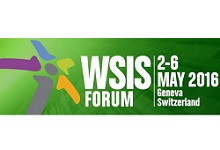Enhanced cooperation and internet governance
2 May 2016 14:30h
Event report
[Read more session reports and live updates from the WSIS Forum 2016.]
Enhanced Cooperation and Internet Governance, included in the Tunis Agenda back in 2005, has been under debate for many years. This session saw actors from different sectors state their points of view about the state of play following the previous UN Commission on Science and Technology for Development’s (CSTD) Working Group on Enhanced Cooperation (WGEC) effort, the way forward, and roles and responsibilities of all stakeholders, among others.
Moderator Ms Chinmayi Arun (Executive Director at the Centre for Communication Governance, National Law University India) posed three questions to the panellists:
- Given the fact a new WGEC was reconstituted, what has changed since the previous working group was constituted, what is the new state of play, and what are the likely mechanics of the new working group as it starts its work?
- How will members of this working group deal with the challenge of agreeing on the meaning of their respective roles and responsibilities?
- What are the contributions of intergovernmental and multistakeholder cooperation in getting governments to discharge their international public policies responsibilities?
Some of the panellists agreed with the need of being patient, of not spending a lot of time defining what Enhanced Cooperation is, but mainly concentrating on redefining processes. Many things, they admitted, have change since the definition of the Tunis Agenda back in 2005.
Dr William J. Drake (International Fellow & Lecturer, Media Change & Innovation Division, IPMZ, University of Zurich) pointed that the term Enhanced Cooperation is a new one and can be interpreted flexibly by different people, as it has been in practice. Drake stated that the ground is different from what it was before. Now they are at the point of deciding if they should continue along the same route or try to follow another direction that could lead to new level of cooperation.
Ms Constance Bommelaer (Senior Director of Global Internet Policy at ISOC) reminded the audience that before 2005, when Enhanced Cooperation and IGF processes were included in the Tunis Agenda, a recognised arrangement for Internet governance existed. These two processes just want to keep a window open for dialogue that does not change the Internet’s multistakeholder nature. As a way forward, she mentioned that there are already agreements coming out from the WSIS+10 review. She highlighted those that indicate that the IGF should be strengthened, and the invitation to the IGF to develop more tangible outputs and enhance its impact in global Internet governance and Internet policies development. In addition, an important point mentioned by Bommelaer was the advance made to revitalise the best practices outcomes for different topics, presented last year.
Ms Anriette Esterhuysen (Executive Director, Association for Progressive Communications, South Africa) pointed out that the working group should not ignore the old, the new, and emerging geopolitical issues and conflicts. It should take account of them, but for practical work and recommendations the focus should be placed on suggestions and mechanisms that can help Internet governance be more inclusive, more effective, more transparent and more in the public interest. Esterhuysen also pointed out the fact that developing countries often lack the mechanisms and resources to get involved in the decision-making processes which are mainly concentrated in North America and Europe.
Ms Dominique Lazanski (Public Policy Director, GSMA, United Kingdom) mentioned the need to have more diversity in the private sector, giving the example that she was the only one from the private sector participating in the debate.
Prof. Wolfgang Kleinwachter (Professor Emeritus, University of Aarhus, Denmark) stated that we should not be naïve. All stakeholders can do their own work and then come to one table. Now is it more complex that it was in the past.
Dr Peter Major (Chair, UN Commission on Science and Technology for Development, Switzerland) promised to try to keep track of impressions stated in the panel and to try include them in the future work of the working group.
by Wanda M. Perez
Related topics
Related event

